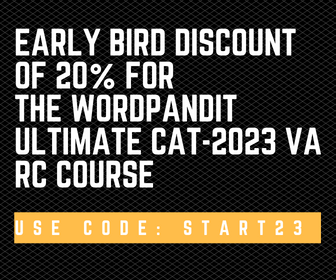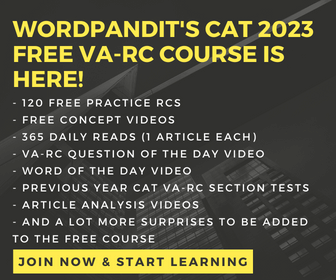- These tests are a check for your learning and are meant to serve as tools for assessment.
- The test is designed to check your current understanding of the language and whether you are able to logically co-relate different parts of a paragraph.
- Directions for individual questions: The questions below have a paragraph given with one sentence missing at the end. From among the answer choices given, select the sentence that can fill the blank to form a coherent paragraph.
Para Completion:Test-2
Congratulations - you have completed Para Completion:Test-2.
You scored %%SCORE%% out of %%TOTAL%%.
You correct answer percentage: %%PERCENTAGE%% .
Your performance has been rated as %%RATING%%
Your answers are highlighted below.
Question 1 |
The Time Traveler (for so it will be convenient to speak of him) was expounding a recondite matter to us. His grey eyes shone and twinkled, and his usually pale face was flushed and animated. The fire burned brightly, and the soft radiance of the incandescent lights in the lilies of silver caught the bubbles that flashed and passed in our glasses. Our chairs, being his patents, embraced and caressed us rather than submitted to be sat upon, and there was that luxurious after-dinner atmosphere when thought roams gracefully free of the trammels of precision. (_________________)
And slowly and steadily, the atmosphere grew stale and lost all the vibrancy it had | |
And he put it to us in this way—marking the points with a lean forefinger—as we sat and lazily admired his earnestness over this new paradox (as we thought it) and his fecundity | |
We sat like toddlers do in a nursery, eagerly anticipating the show the Time Traveler would put on for us | |
We sat benumbed by the proceedings, for the radiance of the Time Traveler was unimaginable and unbearable |
Question 1 Explanation:
In the given case, the author gives a positive portrayal of the time traveler and the scene in concern. Options A and D are rejected as they introduce negative sentiments. Option C is rejected as no show is being put on in the given case. Option B is the best match, as it gels well the tone and narrative of the paragraph. Also, you should try to see how the tone of option B matched the rest of the paragraph and makes it the most appropriate one in the given context
Question 2 |
For the first time I began to realize an odd consequence of the social effort in which we are at present engaged. And yet, come to think, it is a logical consequence enough. Strength is the outcome of need; security sets a premium on feebleness. The work of ameliorating the conditions of life—the true civilizing process that makes life more and more secure—had gone steadily on to a climax. (_________________)
Nature had lorded over humanity with impunity | |
Nature had become a slave of humanity | |
Nature and humanity were involved in the climactic battle of survival | |
One triumph of a united humanity over Nature had followed another |
Question 2 Explanation:
In the given case, the author describes the march of civilization and how progress had continued over a period of time. He goes on to explain how man has evolved and how he managed to subdue nature. Option A goes against the grain of this sentiment, option B is too negative in its stance and its portrayal of nature is too weak, option C pits man versus nature in final battle which is something that we cannot really decide from the context provided. Since man has been able to ameliorate conditions for himself, the best option in the given case is option D, which shows the success of man in the most moderate terms possible.
Question 3 |
Federer's fifth grand slam win prompted a reporter to ask whether he was the best ever. Federer is certainly not lacking in confidence, but he wasn't about to proclaim himself the best ever. "The best player of this generation, yes", he said, "But nowhere close to ever. Just look at the records that some guys have. I'm a minnow". (_________________)
His win against Agassi, a genius from the previous generation, contradicts that | |
Sampras, the king of an earlier generation, was as humble | |
He is more than a minnow to his contemporaries | |
The difference between 'the best of this generation' and 'the best ever' is a matter of perception |
Question 3 Explanation:
According to the question, the author has put forward the question whether Federer is the best player ever or not. While Federer himself feels that he is nowhere close to the best ever. On the other hand, he is even confident enough to accept that he is the best player of this generation. Option A clarifies about Federer defeated Andre Agassi. While option B talks about the humility which is in no way related to the subject. Option C strengthens the main subject and option D takes the debate out of the scope. Hence, option C is thus the right choice
Question 4 |
Thus the end of knowledge and the closing of the frontier that it symbolizes is not a looming crisis at all, but merely one of many embarrassing fits of hubris in civilization's long industry. In the end, it will pass away and be forgotten. Ours is not the first generation to struggle to understand the organizational laws of the frontier, deceive itself that it has succeeded, and goes to its grave having failed. (_________________)
One would be wise to be humble | |
But we might be the first generation to actually reach the frontier | |
But we might be the first generation to deal with the crisis | |
However, this time the success is not illusory |
Question 4 Explanation:
The key point in this case is reflected by the last line of the paragraph, where the author highlights how our generation is not the first to struggle in understanding the frontier and deceiving itself that it has succeeded. What this means is that we have not reached the frontier (the frontier being discussed here is the frontier of knowledge, the end point where we have knowledge of everything). Since knowledge is endless and the end cannot be reached, it would be wise to remain humble and accept that one can always learn more. This sentiment is best reflected by option A.
Question 5 |
I am sometimes attacked for imposing 'rules‘. Nothing could be further from the truth. I hate rules. All I do is report on how consumers react to different stimuli. I may say to a copywriter, “Research shows that commercials with celebrities are below average in persuading people to buy products. Are you sure you want to use a celebrity?” Call that a rule? Or I may say to an art director, “Research suggests that if you set the copy in black type on a white background, more people will read it than if you set it in white type on a black background.” (_________________)
Guidance based on applied research can hardly qualify as ‘rules’ | |
Thus, all my so called ‘rules’ are rooted in applied research | |
A suggestion perhaps, but scarcely a rule | |
Such principles are unavoidable if one wants to be systematic about consumer behaviour. | |
Fundamentally it is about consumer behaviour - not about celebrities or type settings |
Question 5 Explanation:
In the above question, the first three sentences of the paragraph establish the purpose for which the paragraph has been written. Then the writer provides certain example situations. Under option C, the writer tells us what his ‘alleged’ rules are while the writer does not assert even his explanation with undue vigor in the last sentence. Option A is contrary to the main purpose of the paragraph as ‘guidance based on applied research’ makes his actions more binding on others than are rules. Options B and D are also eliminated because of the same reason. Option E talks about one of the examples but it is not related to the purpose of the paragraph. Hence, option C is the right answer choice
Question 6 |
Relations between the factory and the dealer are distant and usually strained as the factory tries to force cars on the dealers to smooth out production. Relations between the dealer and the customer are equally strained because dealers continuously adjust prices - make deals - to adjust demand with supply while maximizing profits. This becomes a system marked by a lack of long-term commitment on either side, which maximize feelings of mistrust. In order to maximize their bargaining positions, everyone holds back information - the dealer about the product and the consumer about his true desires. (_________________)
As a result, ‘deal making’ becomes rampant, without concern for customer satisfaction | |
As a result, inefficiencies creep into the supply chain | |
As a result, everyone treats the other as an adversary, rather than as an ally | |
As a result, fundamental innovations are becoming scarce in the automobile industry | |
As a result, everyone loses in the long run |
Question 6 Explanation:
In this question, ‘As a result’ indicates that one needs to discover the immediate consequences of the details given in the paragraph. Option D is not a consequence at all and hence directly gets eliminated. Options A and B are not consequences but may currently exist; as explained in the paragraph. Option C brings in ‘adversary’ and ‘ally’ and hence cannot be fully justified according to the details given in the paragraph. The direct consequence has been stated briefly in option E, bringing the paragraph to a smooth closure. Hence, option E is the right answer choice
Question 7 |
Let us understand the definition of metaphysics, a purely speculative science, which occupies a completely isolated position and is entirely independent of the teachings of experience. It deals with mere conceptions--not, like mathematics, with conceptions applied to intuition--and in it, reason is the pupil of itself alone. It is the oldest of the sciences. (_________________)
And it would struggle to survive without the architecture of mathematical support that it draws its strength from | |
Yet it continued to baffle mankind because of its abstractions | |
But it has never had and never will have the good fortune to attain to the sure scientific method | |
And it would still survive, even if all the rest were swallowed up in the abyss of an all-destroying barbarism |
Question 7 Explanation:
The given question is solved on the basis of sentiment and tone. The author, in the paragraph, describes what metaphysics is and goes on to explain how it is one of the oldest sciences. In this description of metaphysics, he adopts a positive tone and it can be seen that he appreciates the field. Options A, B and C commit the mistake of being too negative in their approach and rather belittle the field of metaphysics. This makes option D the clear answer, as it is the neutral/positive statement with respect to the field of metaphysics
Question 8 |
Age has a curvilinear relationship with the exploitation of opportunity. Initially, age will increase the likelihood that a person will exploit an entrepreneurial opportunity because people gather much of the knowledge necessary to exploit opportunities over the course of their lives, and because age provides credibility in transmitting that information to others. However, as people become older, their willingness to bear risks declines, their opportunity costs rise, and they become less receptive to new information. (_________________)
As a result, people transmit more information rather than experiment with new ideas as they reach an advanced age | |
As a result, people are reluctant to experiment with new ideas as they reach an advanced age | |
As a result, only people with lower opportunity costs exploit opportunity when they reach an advanced age. | |
As a result, people become reluctant to exploit entrepreneurial opportunities when they reach an advanced age | |
As a result, people depend on credibility rather than on novelty as they reach an advanced age |
Question 8 Explanation:
One needs to establish the purpose of the paragraph by looking at the first and the last sentences given. ('Age has …' and 'however, as people become older...'). Options C and E can be eliminated easily. None of the given options is a consequence of the curvilinear relationship between age and exploitation of opportunity. Option D includes all this and is specific to the ideas presented in the paragraph. Hence, option D is the right answer choice
Question 9 |
We can usefully think of theoretical models as maps, which help us navigate unfamiliar territory. The most accurate map that it is possible to construct would be of no practical use whatsoever, for it would be an exact replica, on exactly the same scale, of the place where we were. Good maps pull out the most important features and throw away a huge amount of much less valuable information. Of course, maps can be bad as well as good - witness the attempts by medieval Europe to produce a map of the world. In the same way, a bad theory, no matter how impressive it may seem in principle, does little or nothing to help us understand a problem. (_________________)
But good theories, just like good maps, are invaluable, even if they are simplified | |
But good theories, just like good maps, will never represent unfamiliar concepts in detail | |
But good theories, just like good maps, need to balance detail and feasibility of representation | |
But good theories, just like good maps, are accurate only at a certain level of abstraction | |
But good theories, just like good maps, are useful in the hands of a user who knows their limitations |
Question 9 Explanation:
The first sentence establishes the main purpose of the paragraph which is to understand the usefulness of theoretical models using the comparison of maps. The purpose is easily fulfilled in option A. Option E is a generalization that the paragraph but does not support it. All the other options also do not support the main idea of the passage. Hence, option A is the right answer choice
Question 10 |
Most people at their first consultation take a furtive look at the surgeon’s hands in the hope of reassurance. Prospective patients look for delicacy, sensitivity, steadiness, perhaps unblemished pallor. On this basis, Henry Perowne loses a number of cases each year. Generally, he knows it’s about to happen before the patient does: the downward glance repeated, the prepared questions beginning to falter, the overemphatic thanks during the retreat to the door. (_________________)
Other people do not communicate due to their poor observation | |
Other patients don’t like what they see but are ignorant of their right to go elsewhere | |
But Perowne himself is not concerned | |
But others will take their place, he thought | |
These hands are steady enough, but they are large |
Question 10 Explanation:
In this question, option A moves away from the core idea of the paragraph i.e losing patients. Option E does not provide for enough data to explain the importance of hands being large. There is no logical continuity in option D. Option C provides a logical finish to the paragraph by showing that inspite of the losing patients, Perowne is not concerned. While option B states that observations of other patients are also negative and those who stay with Perowne do so out of ignorance of available alternatives. This is not in continuation of the main idea expressed in the paragraph. Hence, the option C is the right answer choice
Once you are finished, click the button below. Any items you have not completed will be marked incorrect.
There are 10 questions to complete.
List |



















The correct option is 2 , the actual para source
http://www.newyorker.com/archive/2004/12/20/041220fi_fiction1 ( 13th line )
Reasoning
The idea of passage revolves around , patient so 2 is the option